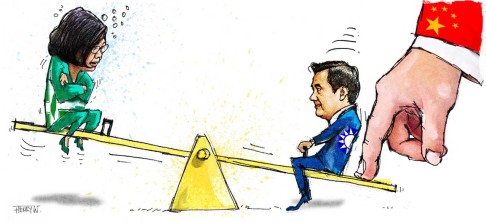Xi-Ma meeting: Transcript of Taiwan President Ma Ying-jeou's opening remarks
SINGAPORE — Leaders of political rivals Taiwan and China met today (Nov 7) for the first time in more than 60 years for talks that come amid rising anti-Beijing sentiment on the self-ruled democratic island and weeks ahead of elections there.
Including their historic handshake, brief opening remarks before reporters and a closed-door session, Chinese President Xi Jinping and Taiwanese President Ma Ying-jeou met for an hour on neutral ground in Singapore.
Here's the transcript of what Taiwan President Ma Ying-jeou said in the first 10 minutes of the meeting that was open to the media:
Mr Xi, friends from the two delegations across the straits, and people present today,
Today, I and Mr Xi in our capacities as leader across the straits, we are holding the future of the two sides across the straits and history.
In April 1993, Mr Koo Chen-fu and Mr Wang Daohan held talks and they inked four agreements that laid the foundations of a mechanism for cross-straits dialogue.
When I spoke with the founding Prime Minister of Singapore Lee Kuan Yew, I said that the foundations of the cross-strait relationship should be based on well being of our people.
What is behind us is the long history of the relationship. In the past few years, we decided to replace conflict with people dialogue and we have stuck to the path of prosperity and wellbeing.
We can swear to the whole world our determination to peaceful development of people’s rights. We follow different political systems, but we develop dialogue in terms of military and economic cooperation. This is not done overnight. There are over 40,000 of cross-strait student exchanges annually. There are US$170 billion of trade value across the straits. These are the fruits of our relations.
The ancient book of “shang shu” says we have to really trust each other and seek pragmatic strategies. In the past few years, we have reached a couple of cooperative deals. This is in line with expectations across the straits and also the global community.
I want to make five proposals for peaceful development:
In 1992, we reached the 1 China consensus. This is the political foundation of cross straits relationship that we both stick to. It is on this foundation that we reached 23 agreements, making the relationship its very best in 66 years.
Second, we have to reduce animosity across the straits. We are never enemies like before. We cannot develop animosity and we need to resolve conflict through dialogue.
Third, increase exchanges and cooperation. We need to establish institutions on each other’s side and create win-win cooperation with each other.
Fourth, we need need hotlines on both sides. As the two exchange foundations across the strait, we have established communication mechanisms. We also have to establish hotlines between Taiwan’s Mainland Affairs Council and China’s Mainland Taiwan Affairs Office.
We are all descendents of the chinese people. We should cooperate together and rejuvenate the Chinese nation.This is not out of our self-interests but for the benefit of our future generations. We must value what people value and safeguard peace across the strait to ensure win-win cooperation.
Mr Xi, today’s cross-strait relations most peaceful since 1994. In the past few years, I always see Taiwanese students discuss and research with Chinese students. I have seen them study together. This is very heartfelt. They are all very passionate and innovative.
以下为台湾领导人马英九讲话全文。
习先生,大陆与台湾代表团的各位女士、先生,以及在场的媒体朋友们,大家午安,大家好!
今天,我与习近平先生分别以台湾与大陆领导人的身分,穿越66年的时空,伸手相握,握着两岸的过去与未来,也握着中华民族振兴的希望,深具历史意义。
22年前,也就是1993年的4月,台湾海基会董事长辜振甫先生与大陆海协会会长汪道涵先生在新加坡会面,签订了4个协议,为两岸制度化协商打下了基础。12年前,也就是2003年的10月,我在“东亚经济高峰会”上,与新加坡建国总理李光耀资政对谈。当时我们都认为:“两岸的发展,要以人民的利益为依归”。
此刻,我和习先生相对而坐,共聚一堂,在我们背后的,是两岸分隔超过一甲子的历史;在我们眼前的,是这几年来,双方致力“以对话取代对立、以和解替代冲突”的成果;在我们手上的,是永续和平与繁荣的目标。此时此刻,海峡两岸正大声向全世界宣示巩固台海和平的决心,以及促进区域和平的讯息。
这66年来,两岸在不同的体制下发展,能够从军事对抗转为合作交流,绝非朝夕之功。7年多来,两岸签订了23项协议,创造了4万多学生交流、每年800万旅客往来与1700多亿美元贸易的空前荣景。这些巨大改变的基础,都在于“和平”。
历史为两岸留下了错综复杂的世代课题,这正是《尚书》所说的“非知之艰,行之惟艰”。对于各自坚持的敏感议题,需要双方正视现实,以智慧、耐心与诚意务实处理。但是,我们依然能够努力在双方这些年来建构的“制度性协商”之下,达成了两岸和解与合作,推动了永续和平与繁荣,而这也是两岸及国际社会共同的期待。
今天,我愿提出维系两岸和平繁荣现状的五点主张:
第一、巩固“九二共识”,维持和平现状。海峡两岸在1992年11月就“一个中国”原则达成的共识,简称“九二共识”。九二共识是两岸推动和平发展的共同政治基础,正是因为双方共同尊重九二共识,过去七年半来,我们才能获致包括达成23项协议在内的丰硕成果与和平荣景,让两岸关系处于66年来最和平稳定的状态。这个部分,等一下在会谈时,我会再进一步说明。
第二、降低敌对状态,和平处理争端。两岸目前已不再处于过去的冲突对立,双方应持续降低敌对状态,并以和平方式解决争端。
第三、扩大两岸交流,增进互利双赢。两岸目前尚未结案的议题,例如货贸协议、两会互设机构、与陆客中转等,应尽速处理,以创造两岸双赢。
第四、设置两岸热线,处理急要问题。两岸目前在海基会、海协会首长之间,与陆委会、国台办副首长之间,均已设有联系机制。今后应在陆委会、国台办首长之间设立热线,以处理紧急与重要问题。
第五、两岸共同合作,致力振兴中华。两岸人民同属中华民族、都是炎黄子孙,应互助合作,致力振兴中华。
这五点主张不是为一己之私、单方之利,而是为了后代子孙的幸福。我诚挚地希望,双方都应该重视人民所珍惜的价值与生活方式,维护两岸和平,以中华文化蕴涵的智慧,确保两岸互利双赢。
习先生,当前的两岸关系,已经是1949年以来最为和平稳定的阶段。这几年,我常常在台湾的大学校园中,看到两岸学生一起讨论、一起运动、一起演奏、一起欢笑的画面。那种自然的水乳交融,往往让我既欣慰,又感动。他们有热情、有创意;但他们没有仇恨,没有包袱;他们能在人生较早的阶段建立友谊,一定可以为两岸永续和平打下更坚实的基础。我们要好好珍惜、扩大这个基础。
北宋大儒张横渠主张“为天地立心,为生民立命,为往圣继绝学,为万世开太平”。习先生,为了两岸人民,让我们一起努力、“为生民立命,为万世开太平”,为中华民族开创更和平灿烂的未来。
谢谢大家!




 It because no paparazzi and tight security in public places when Loong calls for it. It is that simple. So complicate, all armchair experts here in this forum.
It because no paparazzi and tight security in public places when Loong calls for it. It is that simple. So complicate, all armchair experts here in this forum.  Singapore is a peesai. You do well to remember that.
Singapore is a peesai. You do well to remember that. 



